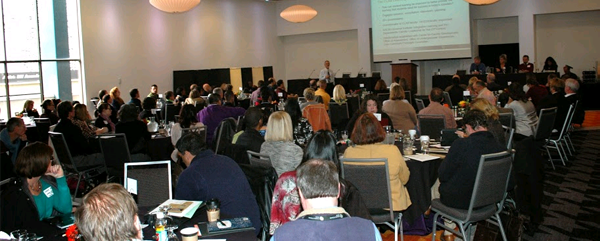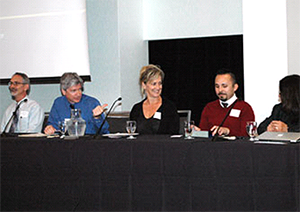Panel the Role of Arts in the Undergraduate Experience


Speaking on a console at the Undergraduate Experiences Symposium, from left, Jeff Franklin, associate dean, College of Liberal Arts and Sciences; Mitch Handelsman, professor of pscychology; Barbara Seidl, associate dean, Schoolhouse of Education and Human being Development; Cecilio Alvarez, academic adviser, CLAS Bookish Advising Function; and Khushnur Dadabhoy, dean of students and assistant vice chancellor, student life.
Much of the discussion at the 9th Annual Undergraduate Experiences Symposium centered on the prefix "multi," which is fitting since 21st century students volition go on to multiple jobs and multiple careers, all of which will crave a wide, multidisciplinary set of skills.
"Twenty to thirty percent of freshmen will go into jobs that didn't exist when they came to our door," said keynote speaker Terrel Rhodes, of the Association of American Colleges and Universities. "Past the fourth dimension students are 38, they'll accept 10 to fourteen different jobs. We have to recall well-nigh preparing our students differently to enter into that kind of employment loonshit."
A record 135 people attended the symposium, forcing host John Lanning, banana vice chancellor for undergraduate experience, to shut registration lest the room at the Curtis Hotel overflow. Attendees enjoyed another robust give-and-take about undergraduate experiences and learning outcomes. The session included a nod to new CU Denver'south new mascot in its title: "Shared Empowerment: Making Integrated Learning Ours (MILO)."
The half-day symposium opened with remarks by Chancellor Don Elliman and Lanning. Elliman said student success is the university'due south pre-eminent priority, and he cited integrative learning as a key opportunity for delivering such success. "I think that's the future of education," Elliman said. "And I think preparing people to solve real-world problems is going to require the sort of cantankerous-disciplinary learning that nosotros accept an opportunity to introduce people to."
Lanning said concluding twelvemonth'south symposium, which had an internal and reflective format, generated more than 100 recommendations. An undergraduate working group distilled those to 13 and a campus-wide survey boiled those down to 3 top priorities. Two of the three take been at least partially implemented, he said: the graduation and caste audit system and the Canvas learning management system that has brought technological options into the classroom. The third goal, which nevertheless needs to be addressed, is expanding staffing in the Experiential Learning Center, to increment internships, he said.
He said a mini-symposium will be held adjacent bound to see what progress has been fabricated from ideas generated nearly integrative learning. "I want you lot to do a piddling dreaming," he told the attendees, who spent part of the symposium brainstorming at their tables. "I want you to think that an inbound freshman or an inbound transfer student knows what the learning objectives are at the University of Colorado Denver. ... None of united states tin can pull this off without working together."
Rhodes' keynote focused on national efforts on shared learning outcomes and integrative learning. "I hope this is not offensive to anybody, but the (educatee's) major isn't the be-all, end-all. It is important, merely equally important are the development of these cross-cutting skills and abilities," he said. "There's the importance of a liberal education, application of skills and -- we were surprised at this -- employers are interested in portfolios and partnerships with colleges and universities."
Rhodes cited results from a national online survey of 318 employers whose organizations accept at least 25 employees. Findings included:
- A majority of employers (56 percentage) express satisfaction with the job colleges and universities are doing to prepare graduates for success in the workplace, but more than two in five signal room for improvement.
- Two in three employers believe well-nigh academy graduates take the skills and knowledge they need to succeed in entry level positions, but only 44 percent think they take what is required for advancement and promotion to higher levels.
Universities need to increase "high-impact practices" (HIPs) that engage students and provide the cross-cut skills required in the 21st century workplace, Rhodes said. HIPs include internships, writing-intensive courses and community service projects. "We accept created curricula that is sort of a medical model of inoculation -- take this class, become that, move on," he said. "... If you desire to get adept at something y'all practice. You lot accept to keep revisiting it. And you can't just keep doing the same affair, y'all've got to keep taking it a petty bit farther, to the adjacent step."
A CU Denver console moved the give-and-take toward identifying integrative learning practices on our campus. Panel members were Jeff Franklin, acquaintance dean of the Higher of Liberal Arts and Sciences; Cecilio Alvarez, academic advisor in the CLAS Bookish Advising Office; Barbara Seidl, associate dean of the School of Education and Human Development; Khushnur Dadabhoy, dean of students and assistant vice chancellor of student life; and Mitch Handelsman, professor of psychology and CU President'south Teaching Scholar.
Franklin and others at the symposium spent the final 18 months as members of the CLAS Learning Enhancement Job Force. The job forcefulness concluded that:
- Students need a broad, cantankerous-cut set of not-discipline specific, transferrable capabilities.
- Providing a more cohesive educational experience contributes to those skills.
- It'due south necessary to take an integrative education approach.
A critical component of integrative didactics, Franklin said, is shifting from a quantitative model to a qualitative one. The quantitative model focuses on achieving a sure number of requirements, such equally credit hours, seat hours and faculty contact hours. The qualitative model, on the other hand, is concerned with whether students are actually learning what is existence presented.
"It's different. It's a unlike headset," Franklin said.
Archives of reports about each previous Undergraduate Experiences Symposium can be found at this website. Click the "Quick Links" section for individual symposium archives.
Source: https://connections.cu.edu/stories/undergraduate-symposium-spotlights-importance-integrative-learning
0 Response to "Panel the Role of Arts in the Undergraduate Experience"
Post a Comment